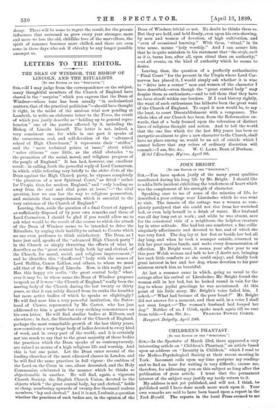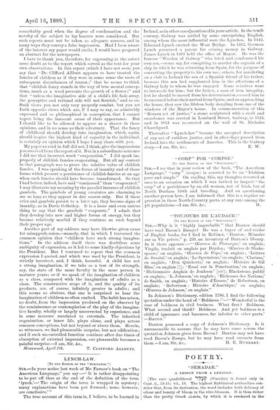CHILDREN'S PHANTASY. [To THE EDITOR OP THE " SPECTATOR."] SIR,—In
the Spectator of March 23rd, there appeared a very interesting article on " Children's Phantasy," an article based upon an address on Insanity in Children," which I read to the Medico-Psychological Society at their recent meeting in York. Incessant calls upon my time postpone my reading> and to find an hour for writing is very difficult ; excuse me, therefore, for addressing you on this subject so long after the publication of your article. I trust that the permanent interest of the subject may justify my tardy return to it.
My address is not yet published, and will not, I think, be published until I have done much more work upon it. Your own remarks are said to have been based upon a report in the York Herald. The reports in the local Press seemed to me
remarkably good when the degree of condensation and the novelty of the subject to lay hearers were considered. But such reports must not be taken as adequate sources, and in many ways they convey a false impression. Had I been aware of the interest my paper would excite, I would have prepared an abstract for the newspapers.
I have to thank you, therefore, for expressing at the outset some doubt as to the report which served as the text for your own observations. In this report (which I have not seen) you say that "Dr. Clifford Allbutt appears to have treated the fancies of children as if they were in some sense the roots of subsequent disturbances of reason ;" that he seems to think that " childish fancy stands in the way of true mental concep- tions, much as a weed prevents the growth of a flower;" and that "unless the imaginative side of a child's life fade away, the perceptive and rational side will not flourish," and so on. Such views you not only very properly combat, but you set forth opposite views which are, if I may so say, so admirably expressed and so philosophical in conception, that I cannot regret being the innocent cause of their appearance. But I shonld like to be allowed to appear as a sharer in these opinions, and in no sense as their adversary. That the fancy of childhood should develop into imagination, which, again, should inspire the highest kind of sagacity in the individual, is certainly an opinion which I hope I may share with you.
My paper as read in full did not, I think, give the impressions you received from the report of it. But in a subordinate sentence I did use that incorrect word " evaporation." I did speak im- properly of childish fancies evaporating. But all my context in that paragraph was to prove the relative value of childish fancies. I was speaking of the forms of insanity and of those forms which present a persistence of childish fancies at an age when such fancies should have become transformed. So that I had better, indeed, have said "condensed" than "evaporated." I may illustrate my meaning by the parallel instance of childish gambols. The gambols of young creatures are charming to see so long as they appear in due season only. But if these cries and gambols persist to a later age, they become signs of insanity, as in Davie Gellatley. It is a loose and even untrue thing to say that the gambols " evaporate." I admit that they develop into new and higher forms of energy, but they become relatively morbid if they continue as such beyond their proper age.
Another part of my address may have likewise given cause for misapprehension,—namely, that in which I traversed the common opinion that " children have such strong imagina- tions." In the address itself there was doubtless some ambiguity of expression, as it led to some kindly objections by the President. But I ventured to repeat that the common expression I quoted, and which was used by the President, is strictly incorrect, and, I think, harmful. A child has not a strong imagination, if we take as a test of its strength, say, the state of the same faculty in the same person in maturer years ; or if we speak of the imagination of children as a class, compared with the imagination of adults as a class. The constructive scope of it, and the quality of its products, are, of course, infinitely greater in adults ; and this seems so obvious, that one is surprised to hear the imagination of children so often exalted. The habit has arisen, no doubt, from the impression produced on the observer by the reminiscence or contemplation of the play of the imagina- tive faculty, wholly or largely uncorrected by experience, and in some measure unrelated to externals. The inherited organisation, or inner life, plays alone, and plays across common conceptions, but not beyond or above them. Herein, as witnesses, we find pleasurable surprise, but not edification ; and if such uncontrolled function continue after due times of absorption of external impression, our pleasurable becomes a painful surprise.—I am, Sir, &c., Meanwood, April 7th. T. CLIFFORD ALLBUTT.



































 Previous page
Previous page